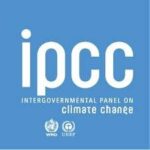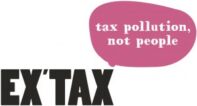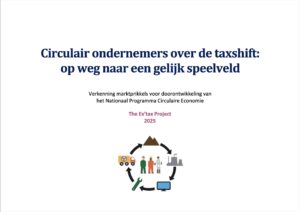The Ex'tax Project
The European Union aims for a circular economy by 2050, but the tax system is still fully aligned with the linear economy. Taxes provide powerful financial incentives and currently, labour taxes are high, while natural resource use and pollution are relatively tax-free. This means that sustainable products remain expensive, and discarding and buying new products remains more attractive than repair and reuse.
The taxshift gradually shifts the tax burden from labour to green taxes by applying the principles of “work must pay off” and “the polluter pays.” This makes it key to an inclusive circular economy.
Since 2009, The Ex’tax Project Foundation conducts in-depth research into the possibilities of a taxshift in Europe and beyond. We advise governments and work with business leaders and experts to develop insights into the impact of the tax mix on the economy, labour market, environment and the decisions entrepreneurs and consumers make on a day-to-day basis.
latest study:
'Circular entrepreneurs on the taxshift'
Commissioned by the Dutch Ministry of Infrastructure and Water Management, this study gathers insights into financial incentives that hinder and promote the circular economy. For this particular study, Ex’tax has interviewed 10 circular entrepreneurs, gathering real-life practical examples of how the tax mix impacts their opportunities to develop and scale up circular business models.
our mission
why
EX’TAX believes that
- Businesses and societies can flourish by saving natural resources and tapping into the abundance of human potential instead.
- Tax systems play a key role in achieving the Global Goals and inclusive circular economies.
We believe that tax can be a force for good.
how
Tax systems should be aligned with the Global Goals and the inclusive circular economy by
- Putting a price on natural resource use and pollution, which would provide incentives to save resources and the natural world, and
- Using the revenues to lower the tax burden on labour and increase (social) spending. This would enable job creation and support those who need it most.
what
EX’TAX contributes to these goals by
- Analysing and showcasing the impact of tax reform on economies, businesses, the environment, jobs and wellbeing.
- Advising and inspiring policy makers on implementation routes.
Let’s share the great story of what tax can do!
global support

António Guterres
Secretary-General of the United Nations
“Solutions exist. First, let’s shift taxes from salaries to carbon. We should tax pollution, not people. Second, stop subsidizing fossil fuels. Taxpayers’ money should not be used to boost hurricanes, spread drought and heat waves, and melt glaciers.” read more

European Commission
“Labour tax cuts can be a tool promoting higher levels of employment. Shifting taxation to other tax bases is one possible option. Tax bases less detrimental to growth include consumption taxes, housing taxes & environmental taxes.” read more

BSCD (Business and Sustainable Development Commission)
“Business leaders must (…) work openly with regulators, business and civil society to shape fiscal and regulatory policies that create a level playing field more in line with the Global Goals. This could involve fiscal systems becoming more progressive through putting less tax on labour income and more on pollution and under-priced resources.” read more

Ellen MacArthur Foundation, McKinsey & SUN
“Shifting taxes from labour to finite resources could level the playing field for more labour-intensive, but less resource-intensive practices. This creates jobs, while saving resources.” read more

OECD
“Increased or more effective use of environmentally related taxes can drive growth-oriented reform by shifting the tax burden away from more distortive taxes, e.g. on corporate or personal income, and contribute to fiscal consolidation.” read more

IPCC (Intergovernmental Panel on Climate Change)
“offsetting increased carbon prices with lower labour taxes can potentially decrease labour costs (without affecting salaries), enhance employment and reduce the attractiveness of informal economic activity” read more

our impact: highlights
- Study: [in Dutch] 'Circulair ondernemers over de taxshift: op weg naar een gelijk speelveld.
- Six ministers have sent a letter to the Dutch Senate, stating that the taxshift is ‘economically sensible’, with a detailed ‘appreciation’ of Ex’tax studies
- The largest Dutch banks sign a Statement with the Ministry of Infrastructure calling to “Explore making agreements at European and national levels about shifting taxes from labour to resources (Ex’tax)”
- Ex’tax mentioned in the 2024 Dutch central government budget
- Study on labour tax reductions: Work should pay off (in Dutch: Werk moet lonen)
- Dutch Banking Association position paper calls for Ex’tax approach
- North Sea Commission adopts taxshift resolution
- European Commission’s EU Green Week panel
- European Commission’s EU Sustainable Energy Week panel
- European Commission’s high-level Tax Symposium on the Tax Mix of the Future
- New publication: The Taxshift. An EU Fiscal Strategy to Support the Inclusive Circular Economy
- Scenario and modeling results available for each of the 27 EU Member States
- Dutch Senate motion: government is to report on Ex’tax recommendations
- Publication (in Dutch): Deltaplan Belastingen voor een Circulaire en Sociale Economie. -> EU-edition published in 2022
- Dutch PM and State Secretary for Taxation support the taxshift principles.
- Advising the sub-committee on tax matters of the European Parliament (FISC).
- World Business Council for Sustainable Development Vision 2050 includes taxshift principles.
- Video testimonials by entrepreneurs.
- Case study Bangladesh
- ACCA paper translated in Chinese
- Finland Coalition Agreement includes Ex’tax recommendations
- Lecture series, Costa Rica
- ACCA &Deloitte organise Ex’tax event, Brussels
- Side-event World Economic Forum, Davos
- ACCA publishes our discussion paper Tax as a force for good
- Case study Finland
- Mention in OECD Taxing Energy Use 2018 report
- Side-event World Economic Forum Davos
- Mention in OECD report for the G7 Environment Ministers, presentations OECD NAEC Seminar & OECD Forum
- Dutch Coalition Agreement includes Ex’tax principles
- Portugese Council of Ministers Resolution includes Ex’tax
- Case study European Union, in cooperation with Deloitte, EY, KPMG Meijburg, PwC, Cambridge Econometrics and Trucost
- Advising the Finance Committee of the Dutch House of Representatives on the Tax Review
- Ex’tax makes it into European Parliament Resolution
- Case study The Netherlands, in cooperation with Deloitte, EY, KPMG Meijburg, PwC
The Ex’tax Project is founded
Eckart Wintzen publishes the first integrated annual report and develops the concept of Value Extracted Tax.



